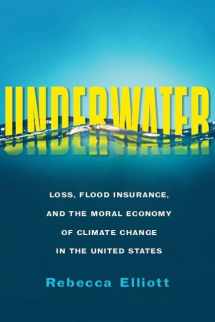
Underwater: Loss, Flood Insurance, and the Moral Economy of Climate Change in the United States (Society and the Environment)
Book details
Summary
Description
Product Description
Communities around the United States face the threat of being underwater. This is not only a matter of rising waters reaching the doorstep. It is also the threat of being financially underwater, owning assets worth less than the money borrowed to obtain them. Many areas around the country may become economically uninhabitable before they become physically unlivable.
In
Underwater, Rebecca Elliott explores how families, communities, and governments confront problems of loss as the climate changes. She offers the first in-depth account of the politics and social effects of the U.S. National Flood Insurance Program (NFIP), which provides flood insurance protection for virtually all homes and small businesses that require it. In doing so, the NFIP turns the risk of flooding into an immediate economic reality, shaping who lives on the waterfront, on what terms, and at what cost.
Drawing on archival, interview, ethnographic, and other documentary data, Elliott follows controversies over the NFIP from its establishment in the 1960s to the present, from local backlash over flood maps to Congressional debates over insurance reform. Though flood insurance is often portrayed as a rational solution for managing risk, it has ignited recurring fights over what is fair and valuable, what needs protecting and what should be let go, who deserves assistance and on what terms, and whose expectations of future losses are used to govern the present. An incisive and comprehensive consideration of the fundamental dilemmas of moral economy underlying insurance,
Underwater sheds new light on how Americans cope with loss as the water rises.
Review
In this essential book, Rebecca Elliott narrates the history of the individualization of risk through an unlikely lens: the de-mutualization of flood insurance in the United States. As rising global temperatures wreak havoc on the climate, those living in the path of storms are increasingly left to deal with the consequences on their own. This is a rich and deeply human story about people and organizations going underwater, learning to make sense of loss and to become ‘resilient’―until the next wave. -- Marion Fourcade, author of
Economists and Societies: Discipline and Profession in the United States, Britain, and France, 1890s to 1990s
Underwater is a masterpiece of social and historical analysis, revealing the increasingly powerful and contested role of the insurance industry―through its rationalities, technologies, and moral economy―in an age of climate crisis. It opens on the impossible decision so many of us facing climate-driven catastrophes in the places we live must now make: to retreat or to remain. As Elliot shows in incisive, often painful detail, these decisions force us to reckon with multiple forms of loss―some measured in our ties to buildings, communities, landscapes, and ways of life, others in the dollar amounts of our insurance coverage and housing investments. These vital reckonings, meanwhile, differ depending on where we live, whether we own our homes, and how 'deserving' we are perceived to be―all variables profoundly shaped by race and class. Elliott compellingly situates these struggles within an emergent 'politics of loss'―itself the flip-side of ever more inadequate politics of sustainability. Disparities and precarities driven both by policy and escalating hazard have ushered in an engaged, often enraged 'climate public,' and wrought havoc in the insurance industry itself. Through this brilliant, moving, and elegantly written analysis, we see a space opening for radical reimagining. What if we reject the devolution of risk and individualizing logics of insurance and housing markets, and recognize our collective interdependence? Elliott leaves us with a crucial understanding: there can be no safer ground if we go it alone. -- Miriam Greenberg, coauthor of
Crisis Cities: Disaster and Redevelopment in New York and New Orleans
In this lucidly


We would LOVE it if you could help us and other readers by reviewing the book
Book review



